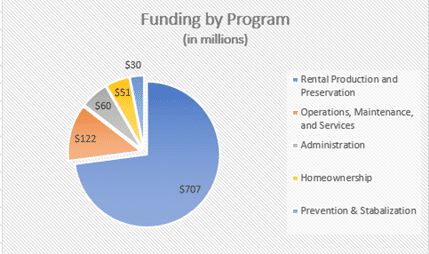Published on:
Seattle voters will decide whether to renew a proposed levy to fund affordable housing over the next seven years. The $970 million measure will appear on the November 7 General Election ballot.
If passed by a simple majority of voters, the owner of a median-valued home would pay $383 a year. That’s about three times more than their current expenditure (around $122/year) for the 2016 levy, which expires this year. The rate for the renewing levy is based on 45 cents per $1,000 of assessed valuation.

Proponents of the replacement levy say it would produce nearly 35% more affordable housing than the 2016-2023 levy. Funds would be allocated across five categories, with rental production and preservation receiving about 73% of the total. Project administration would cost $60 million (about 6% of the total).
More than 9,000 low-income individuals and families will be served by the 2023 Housing Levy. If approved, funding would provide diverse – and expanded — options for affordable housing throughout the city, along with direct assistance to prevent homelessness.
The package encompasses more than 3,500 units of new affordable housing citywide, including rentals and homeownership opportunities. It also has provisions for developing housing that incorporates a mix of uses such as childcare, small business opportunities, and cultural spaces.
“Our city’s affordable housing crisis demands bold, effective, and proven solutions that meet the moment and drive real progress through new units and support to keep people in their homes,” stated Seattle Mayor Bruce Harrell upon signing the legislation to place the levy on the November ballot.
Harrell said the proposal builds on the strong outcomes of previous housing levies and “responds to the scale and urgency of our housing needs by investing in safe and affordable housing, direct assistance for those at risk of homelessness, and a stronger foundation for healthy and resilient communities.”
The Housing Development Consortium of Seattle-King County called the proposed levy “our single best tool for investing in the permanent, affordable housing Seattle so desperately needs,” adding, “Homes are foundational for individual and community health, safety, and resilience.” The group has prepared a two-page overview of the 2023 Seattle Housing Levy. It notes over half of all residents of levy-funded homes are people of color.
“The Housing Levy’s homeownership programs bridge the racial wealth gap and address stark disparities in homeownership rates,” HDC emphasized in its statement of support.
Councilmember Teresa Mosqueda said passage of the levy renewal legislation culminates “over a year’s worth of deep stakeholder engagement and policy development.” Participants included a 20-member Technical Advisory Committee made up of subject matter experts, private and nonprofit housing developers, service providers, labor representatives, and public housing and homelessness agencies.
Mosqueda, chair of the council’s Select Committee on the 2023 Housing Levy, praised the collaborative process to craft the renewal legislation, saying it “reflects councilmember priorities that will enhance our focus on serving communities most impacted by our housing, homelessness, and displacement crises.”
More than 70% of voters approved the 2016 levy. Seattle voters have consistently supported the housing levy since its inaugural year in 1986 (five previous cycles). During the nearly 40 years of its existence, over 16,000 people have benefited at any given time, living in safe, stable levy-funded housing units. Levy-funded homes are required to remain affordable for at least 50 years.